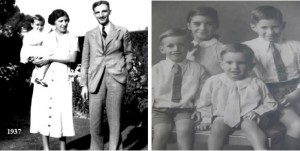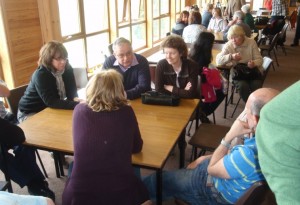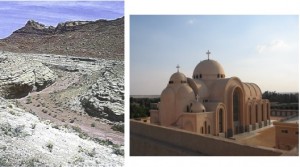The true heart of the Christian life lies not so much in talking, but in action. How I live – the example I give – is much more important than what I say.
If I am not at peace, deeply within myself, my actions will never be more important than my words; once at peace within, I may not mind too much what others say, or do, even if I prefer not to say, or do, some of the things that they may practise. What they say, or do, does affect me, but, usually, it is best not to judge others, or say anything against them, in criticism of their talking or their actions. Overall, it is often wiser to stay silent, using the silence that comes from strength and from knowing how to speak in the right way, at the right time. Criticism that is constructive can be helpful, certainly, if it is given out of love, like a loving parent guiding a young child in the ways of good behaviour, or a good teacher, encouraging and guiding a pupil.
I could not have that spirit of silent love, unless I knew, for certain, that God loves me very much. I have to be very certain of the presence of Love, which is light, in my heart, when I see, all around me, people speaking with gay abandon, and in ways that go against God and his Love – something that seems to happen so often. People have opinions; they make judgements and act in ways that are far from the Gospel values. I cannot blame these people, nor do I judge them, because I am all too aware, that I have done exactly the same as they do – maybe worse; even now it may be probable that I continue sometimes in that vein. It is all so easy for me to come up with a harsh judgement of others, rather than with mercy. Not to judge is something to be lovingly acquired, and leads to self-discipline and control, which allows me, (on my good days), not to react, as I see something more positive in that person, the presence of God, in them, or, at least, the potential presence of God.
When I reflect about how to gain – how to come by – this inner peace, for myself, or for others, I realise it is, probably, the result – the consequence – of, or from, some event that has wrought changes in that person; I would suggest that such changes have led to a deeper understanding about the way to follow God’s loving will.
In my case, I waited a long time before gaining this knowledge. I was 29 years old, and already ordained a priest, when it occurred. This is not, in any way, to blame my parents, with whom, basically, I shared my life until eighteen years of age. They gave me a very good example of Christian living and, through them, I was very deeply rooted in my Christian Catholic life. However, it is probable that I was, even then, too self-centred to see the reflection of God in them, and I did not have the grace to see beyond their limitations. All human beings suffer from limitations and faults.
(1) The Cotton Family in 1937 (2) Fr. Jonathan and siblings. He is the youngest one.
Between the ages of 18 to 29, I led the life of young monk, in our monastery at Ampleforth, and that period was one of many ‘ups’ and ‘downs’. Strange to tell, even in the monastery, I did not discover the foundation-stone of Christian living. In fact, I needed a new gift from God, to realise – to begin to understand – that God, himself, had a huge and intense love for me.
Tertullian, an early Christian writer, commented in the year 200 AD, in his “Apology”, on how pagan, non-Christians, noted the example given by true disciples: “Look,” they (the pagans) say, “how they love one another” (for they themselves hate one another); “and how they are ready to die for each other” (for they themselves are readier to kill each other). As John 13: 35 puts it: “By this everyone will know that you are my disciples, if you love one another.”
As I write this, it is the feast day of Saint Pachomius, (292 – 348 AD), and he was a pagan of good will, who was converted to God by the love of Christians …. through events …. as they occurred. It was this same love, seen in practice, that wrought changes in me, and it happened in July 1972, at Middleton, when I went to the Mariapolis. At this “Work of Mary”, I saw ordinary men and women who had not enjoyed my long monastic Christian training; however, they shared a secret among themselves – a simple secret – that God had chosen them, that God truly loved them and, consequently, they loved each other – and all with whom they came into contact. Actually, they did nothing much that could be called special or extra-ordinary, but among them, there was a sure peace and love. They had that strength, within, from God, that enabled them to listen, to empathise and to be loving towards others. In 1972, I had some difficult challenges to face, challenges that made me doubt the monastic calling, already begun. After my experience at the Mariapolis, those doubts disappeared and, from then on, despite facing many other challenges, that go on to this day, I have never doubted my monastic vocation. Indeed, in the process, it has been much strengthened.
Mariapolis 2014 in Mid Wales
Fortunately, there is a description of Saint Pachomius’ conversion, taken from his biography written by a fellow monk-companion, soon after his death in 348 AD. It illustrates, in a different context, what happened to me in 1972 – just one thousand, seven hundred years later.
Pachomus was born in Upper Thebais about the year 292, of idolatrous parents, and was educated in their blind superstition, and in the study of the Egyptian sciences. From his infancy, he was meek and modest, and had an aversion to the profane ceremonies used by the infidels in the worship of their idols. Being about twenty years of age, he was pressed into the emperor’s troops, probably the tyrant Maximinus, who was master of Egypt from the year 310; and in 312 made great levies to carry on a war against Licinius and Constantine. He was, with several other recruits, put on board a vessel that was sent down the river. They arrived in the evening at Thebes, or Diospolis, the capital of Thebais, a city in which dwelt many Christians. Those true disciples of Christ sought every opportunity of relieving and comforting all that were in distress, and were moved with compassion towards the recruits, who were kept close confined, and very ill-treated. The Christians of this city showed them the same tenderness as if they had been their own children; took all possible care of them, and supplied them liberally with money and necessaries.
Such an uncommon example of disinterested virtue made a great impression on the mind of Pachomius. He inquired who their pious benefactors were, and when he heard that they believed in Jesus Christ the only Son of God, and that in the hope of a reward in the world to come, they laboured continually to do good to all mankind, he found kindled in his heart a great love of so holy a law, and an ardent desire of serving the God whom these good men adored.
(1) Desert around St Pachomius’ Monastery (2) St Pachomius’ Monastery today.
Pachomius was later baptised, became a monk of renown, and was the first to encourage a common life for monks who, before him, had been hermits. From this conversion came the great monastic tradition; in some senses, this is the ‘mother’ of all today’s Religious Life. What a tremendous good that loving Christian activity, in Thebais all those years ago, did for the whole of humanity! So it could be today.
Father Jonathan
If any reader should be interested, there is a ‘YouTube’ video about the Mariapolis that can be downloaded and seen at http://vimeo.com/94639010. This year the Mariapolis takes place from August 11 to 16 at Strathallan School, Forgandenny, Perth, Scotland.



